英语倒装句的用法
- 格式:doc
- 大小:59.50 KB
- 文档页数:6

倒装句的作用倒装句是英语语法中的一种句子结构,在倒装句中,谓语动词和主语的顺序颠倒。
倒装句可以用于肯定句、否定句、疑问句以及特殊情况下的特殊句型。
倒装句有着多种作用和功能,以下是其中一些常见的作用和用法。
1.强调句首成分倒装句可以通过将句子的主语、状语或其他成分置于句首来实现强调的效果。
例如:- "Not only did she finish the project on time, but she also exceeded our expectations."(她不仅按时完成了项目,还超出了我们的预期。
)- "Here comes the bus!"(车来了!)在这些例子中,倒装句用于强调句子中的某个成分,使其更加突出。
2.表示条件在表示条件的句子中,一般会采用倒装结构,将条件状语从句的谓语动词提前。
例如:- "Should you have any questions, feel free to ask."(如果你有任何问题,请随时问。
)- "Had he worked harder, he would have passed the exam."(如果他努力学习,他就能通过考试。
)这种倒装句结构可以使条件更加突出和强调。
3.疑问句在一般疑问句中,动词通常要倒装到主语的前面。
例如:- "Do you like to travel?"(你喜欢旅行吗?)- "Have you finished your homework?"(你完成作业了吗?)倒装句的疑问形式使得问题更加明确,语气更加直接。
4.特殊句型倒装句也用于特殊句型中,例如:- “So +助动词/情态动词+主语”:"So did I."(我也是。
)- “Neither/nor +助动词/情态动词+主语”:"Neither do I."(我也不。
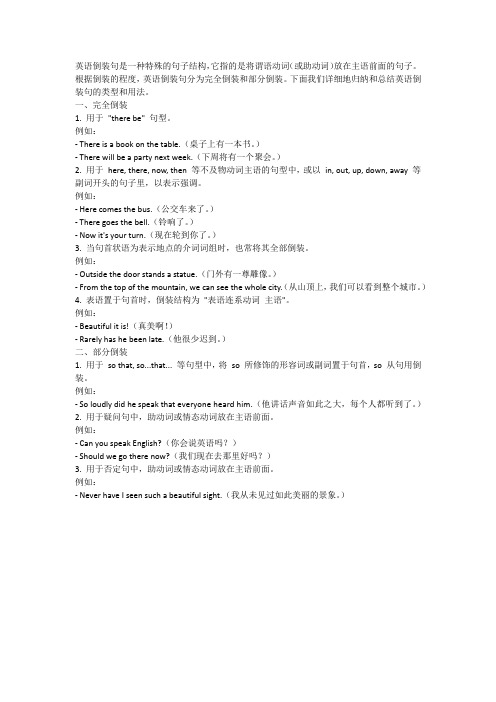
英语倒装句是一种特殊的句子结构,它指的是将谓语动词(或助动词)放在主语前面的句子。
根据倒装的程度,英语倒装句分为完全倒装和部分倒装。
下面我们详细地归纳和总结英语倒装句的类型和用法。
一、完全倒装1. 用于"there be" 句型。
例如:- There is a book on the table.(桌子上有一本书。
)- There will be a party next week.(下周将有一个聚会。
)2. 用于here, there, now, then 等不及物动词主语的句型中,或以in, out, up, down, away 等副词开头的句子里,以表示强调。
例如:- Here comes the bus.(公交车来了。
)- There goes the bell.(铃响了。
)- Now it's your turn.(现在轮到你了。
)3. 当句首状语为表示地点的介词词组时,也常将其全部倒装。
例如:- Outside the door stands a statue.(门外有一尊雕像。
)- From the top of the mountain, we can see the whole city.(从山顶上,我们可以看到整个城市。
)4. 表语置于句首时,倒装结构为"表语连系动词主语"。
例如:- Beautiful it is!(真美啊!)- Rarely has he been late.(他很少迟到。
)二、部分倒装1. 用于so that, so...that... 等句型中,将so 所修饰的形容词或副词置于句首,so 从句用倒装。
例如:- So loudly did he speak that everyone heard him.(他讲话声音如此之大,每个人都听到了。
)2. 用于疑问句中,助动词或情态动词放在主语前面。
例如:- Can you speak English?(你会说英语吗?)- Should we go there now?(我们现在去那里好吗?)3. 用于否定句中,助动词或情态动词放在主语前面。

英语倒装句语法总结英语倒装句是一种句法结构,它通过将主语和助动词的位置颠倒,以实现强调、表示条件或修饰的功能。
倒装句在英语中常常用于口语和书面语中,给文本增加了一定的变化和兴趣。
在本文中,将对英语倒装句进行详细总结,以便读者更好地理解和运用这一语法结构。
一、完全倒装句在完全倒装句中,整个谓语动词位于主语之前,这种倒装句一般用于以下几种情况:1. 当以“here”、“there”、“now”或表示地点、时间的副词开头的句子时,倒装句常被使用。
例如:Here comes the bus.There goes John.Now is the time for action.2. 在以表示否定意义的副词或短语开头的句子中,倒装句也常见。
例如:Never have I seen such a beautiful sunset.Not only is she talented, but she is also kind-hearted.3. 在以“only”开头修饰状语从句的句子中,倒装句也经常使用。
例如:Only when you face your fears can you overcome them.Only in this way can the problem be solved.二、部分倒装句部分倒装句中,只将助动词或情态动词放在主语之前,而将主语与谓语动词的位置维持原状。
部分倒装句常用于以下几种情况:1. 当以否定副词“never”、“seldom”或“rarely”开头时,部分倒装句可以被采用。
例如:Never have I been so happy.Seldom does he complain about anything.2. 在以“so”或“such”引导的句子中,为了表达强调,可以使用部分倒装句。
例如:So tired was she that she fell asleep on the couch.Such is the power of love that it can conquer all obstacles.3. 在以“not”开头的句子中,为了增强否定的语气,常常使用部分倒装句。
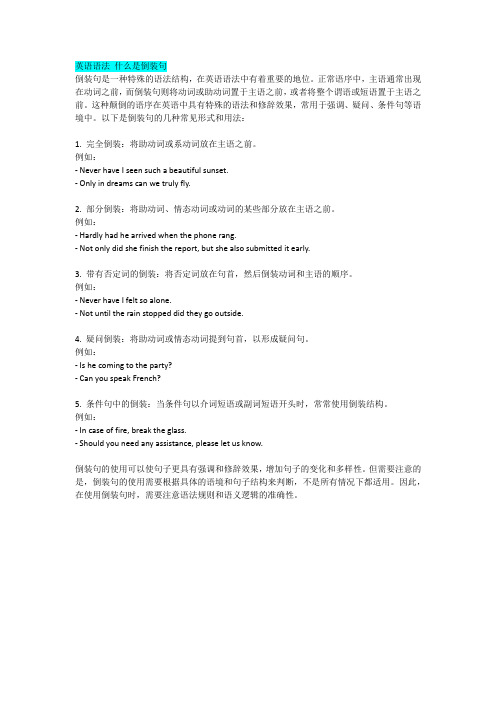
英语语法什么是倒装句倒装句是一种特殊的语法结构,在英语语法中有着重要的地位。
正常语序中,主语通常出现在动词之前,而倒装句则将动词或助动词置于主语之前,或者将整个谓语或短语置于主语之前。
这种颠倒的语序在英语中具有特殊的语法和修辞效果,常用于强调、疑问、条件句等语境中。
以下是倒装句的几种常见形式和用法:1. 完全倒装:将助动词或系动词放在主语之前。
例如:- Never have I seen such a beautiful sunset.- Only in dreams can we truly fly.2. 部分倒装:将助动词、情态动词或动词的某些部分放在主语之前。
例如:- Hardly had he arrived when the phone rang.- Not only did she finish the report, but she also submitted it early.3. 带有否定词的倒装:将否定词放在句首,然后倒装动词和主语的顺序。
例如:- Never have I felt so alone.- Not until the rain stopped did they go outside.4. 疑问倒装:将助动词或情态动词提到句首,以形成疑问句。
例如:- Is he coming to the party?- Can you speak French?5. 条件句中的倒装:当条件句以介词短语或副词短语开头时,常常使用倒装结构。
例如:- In case of fire, break the glass.- Should you need any assistance, please let us know.倒装句的使用可以使句子更具有强调和修辞效果,增加句子的变化和多样性。
但需要注意的是,倒装句的使用需要根据具体的语境和句子结构来判断,不是所有情况下都适用。
因此,在使用倒装句时,需要注意语法规则和语义逻辑的准确性。
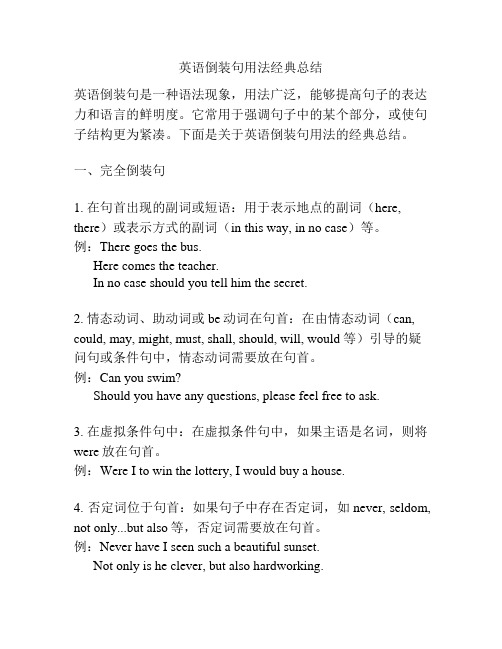
英语倒装句用法经典总结英语倒装句是一种语法现象,用法广泛,能够提高句子的表达力和语言的鲜明度。
它常用于强调句子中的某个部分,或使句子结构更为紧凑。
下面是关于英语倒装句用法的经典总结。
一、完全倒装句1. 在句首出现的副词或短语:用于表示地点的副词(here, there)或表示方式的副词(in this way, in no case)等。
例:There goes the bus.Here comes the teacher.In no case should you tell him the secret.2. 情态动词、助动词或be动词在句首:在由情态动词(can, could, may, might, must, shall, should, will, would等)引导的疑问句或条件句中,情态动词需要放在句首。
例:Can you swim?Should you have any questions, please feel free to ask.3. 在虚拟条件句中:在虚拟条件句中,如果主语是名词,则将were放在句首。
例:Were I to win the lottery, I would buy a house.4. 否定词位于句首:如果句子中存在否定词,如never, seldom, not only...but also等,否定词需要放在句首。
例:Never have I seen such a beautiful sunset.Not only is he clever, but also hardworking.5. Only修饰副词、介词短语或状语从句时:当only修饰副词、介词短语或状语从句时,倒装现象会出现。
例:Only in this way can we solve the problem.Only when he arrived did she start to cook.6. 某些表示条件的介词短语:由in case, in the event that或on condition等表示条件的介词短语引导的句子中,介词短语需要放在句首。
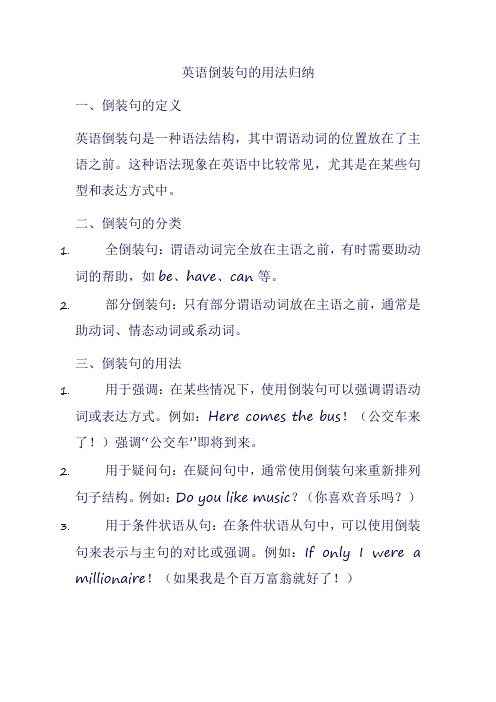
英语倒装句的用法归纳一、倒装句的定义英语倒装句是一种语法结构,其中谓语动词的位置放在了主语之前。
这种语法现象在英语中比较常见,尤其是在某些句型和表达方式中。
二、倒装句的分类1.全倒装句:谓语动词完全放在主语之前,有时需要助动词的帮助,如be、have、can等。
2.部分倒装句:只有部分谓语动词放在主语之前,通常是助动词、情态动词或系动词。
三、倒装句的用法1.用于强调:在某些情况下,使用倒装句可以强调谓语动词或表达方式。
例如:Here comes the bus!(公交车来了!)强调“公交车”即将到来。
2.用于疑问句:在疑问句中,通常使用倒装句来重新排列句子结构。
例如:Do you like music?(你喜欢音乐吗?)3.用于条件状语从句:在条件状语从句中,可以使用倒装句来表示与主句的对比或强调。
例如:If only I were a millionaire!(如果我是个百万富翁就好了!)4.用于让步状语从句:在让步状语从句中,可以使用倒装句来表示转折关系。
例如:Try to find a way to solve the problem!(试着找到解决问题的方法!)5.用于虚拟语气:在虚拟语气中,可以使用倒装句来表示与实际情况相反的情况。
例如:If I were you,I would go to the party.(如果我是你,我会去参加派对。
)6.用于某些固定句型:有些固定句型要求使用倒装句。
例如:“Hardly had she sat down when the phone rang.”(她刚坐下电话就响了。
)7.表示惊讶、感叹、讽刺等情绪时也可以使用倒装句。
例如:How could you do such a thing!(你怎么能做出这种事!)四、倒装句的用法归纳总结1.英语倒装句是一种语法结构,主要有全倒装句和部分倒装句两种类型。
2.使用倒装句可以强调谓语动词或表达方式,也可以用于疑问句、条件状语从句、让步状语从句和虚拟语气等语法结构中。

英语倒装句的使用方法倒装句在英语语法中是一个重要的结构,它可以改变句子的语序,使得表达更加生动、强调更为突出。
本文将介绍英语倒装句的使用方法,帮助读者理解并正确运用这一语法结构。
一、倒装句的基本形式倒装句的基本形式是将谓语动词的助动词或情态动词置于主语之前,可以用于陈述句、疑问句和条件句中。
以下是一些常见的倒装句的形式:1. 完全倒装:将助动词或情态动词置于主语之前,主语紧随在后。
例句1:Never have I seen such a beautiful sunset.例句2:Not only does she speak English fluently, but she also speaks French.2. 部分倒装:只将谓语动词的助动词或情态动词置于主语之前。
例句1:Have you finished your homework?例句2:Can she play the piano?二、倒装句的用法及注意事项1. 当句子以表示地点、方向、方式等的副词或短语开头时,可以使用完全倒装。
例句1:Under the tree sat a group of children, laughing and chatting.例句2:On the top of the hill stands a lonely house.2. 在表示否定意义的副词或词组在句首时,可以使用完全倒装。
例句1:Not only did he fail the exam, but he also lost his scholarship.例句2:Never have I been so disappointed.3. 在条件句中,为了强调条件而将“if”或“unless”置于句首时,可以使用完全倒装。
例句1:Should you need any assistance, please do not hesitate to contact us.例句2:Were it not for her guidance, I would not have succeeded.4. 在一些固定的短语或句型中,也常常使用倒装句。

英语倒装句的用法归纳总结
英语倒装句是指把谓语动词或助动词放在主语之前的句型结构。
它通常用于强调句子中的某一部分,或者在特定的语法情况下使用。
下面我将对英语倒装句的用法进行归纳总结:
1. 全部倒装,在句首将整个谓语动词短语倒装,主要用于表示
强调或者表示条件。
例如,Only then did I realize the importance of the decision.
2. 部分倒装,将助动词、情态动词或者连词后面的主语和谓语
动词倒装,主要用于表示否定、半否定、以及表示方向性的副词短语。
例如,Not only did he finish the project on time, but
he also exceeded our expectations.
3. 倒装疑问句,在一般疑问句中,助动词或情态动词与主语倒装。
例如,Can you swim?
4. 倒装条件句,在以"should", "had", "were"开头的条件句中,主句的谓语动词和主语倒装。
例如,Had I known about the meeting, I would have attended.
5. 倒装句型用于表示方向性的副词短语,如,Here comes the bus.
总的来说,英语倒装句的使用有一定的规律,主要用于强调、
条件句、疑问句和特定的副词短语。
在写作和口语表达中,合适地
运用倒装句可以使语言更加生动有力。
希望以上总结对你有所帮助。
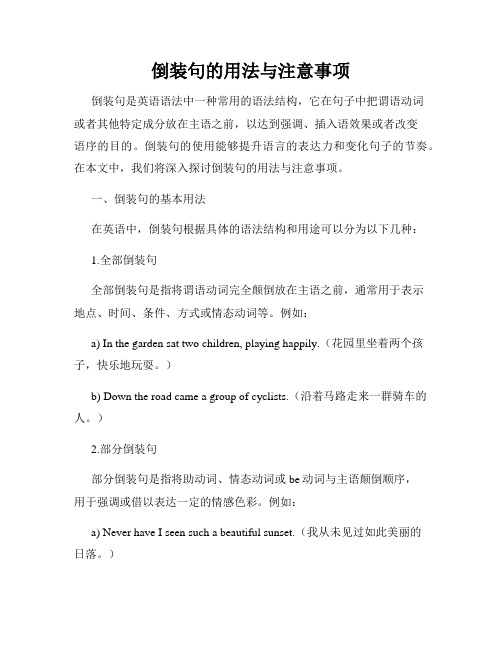
倒装句的用法与注意事项倒装句是英语语法中一种常用的语法结构,它在句子中把谓语动词或者其他特定成分放在主语之前,以达到强调、插入语效果或者改变语序的目的。
倒装句的使用能够提升语言的表达力和变化句子的节奏。
在本文中,我们将深入探讨倒装句的用法与注意事项。
一、倒装句的基本用法在英语中,倒装句根据具体的语法结构和用途可以分为以下几种:1.全部倒装句全部倒装句是指将谓语动词完全颠倒放在主语之前,通常用于表示地点、时间、条件、方式或情态动词等。
例如:a) In the garden sat two children, playing happily.(花园里坐着两个孩子,快乐地玩耍。
)b) Down the road came a group of cyclists.(沿着马路走来一群骑车的人。
)2.部分倒装句部分倒装句是指将助动词、情态动词或be动词与主语颠倒顺序,用于强调或借以表达一定的情感色彩。
例如:a) Never have I seen such a beautiful sunset.(我从未见过如此美丽的日落。
)b) Not only does she play the piano, but she also sings well.(她不仅会弹钢琴,还会唱歌。
)3.祈使句倒装在祈使句中,主语常常被省略,此时谓语动词直接放在句首,以表示命令、要求、建议等意义。
例如:a) Be quiet!(安静!)b) Sit down, please.(请坐。
)二、倒装句的注意事项在使用倒装句时,需要注意以下几点:1.仅适用于肯定句和祈使句倒装句通常只适用于肯定句和祈使句,而疑问句一般不使用倒装结构。
2.助动词、情态动词和be动词的倒装倒装结构通常在助动词、情态动词和be动词后面使用,而不适用于其他动词。
3.标点符号的使用在倒装句中,标点符号的使用要特别注意。
一般情况下,如果倒装结构作为句子的开始部分,则需要在倒装结构之后使用逗号隔开。
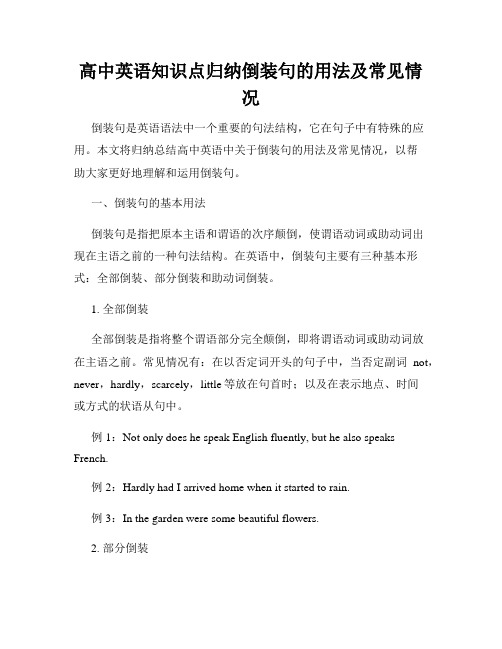
高中英语知识点归纳倒装句的用法及常见情况倒装句是英语语法中一个重要的句法结构,它在句子中有特殊的应用。
本文将归纳总结高中英语中关于倒装句的用法及常见情况,以帮助大家更好地理解和运用倒装句。
一、倒装句的基本用法倒装句是指把原本主语和谓语的次序颠倒,使谓语动词或助动词出现在主语之前的一种句法结构。
在英语中,倒装句主要有三种基本形式:全部倒装、部分倒装和助动词倒装。
1. 全部倒装全部倒装是指将整个谓语部分完全颠倒,即将谓语动词或助动词放在主语之前。
常见情况有:在以否定词开头的句子中,当否定副词not,never,hardly,scarcely,little等放在句首时;以及在表示地点、时间或方式的状语从句中。
例1:Not only does he speak English fluently, but he also speaks French.例2:Hardly had I arrived home when it started to rain.例3:In the garden were some beautiful flowers.2. 部分倒装部分倒装是指将助动词,或情态动词,或谓语动词的某些形式移到主语之前。
常见情况包括:带有否定意义的词或短语出现在句首时;含有表示条件的副词或介词短语的句子;以及为了强调某一部分内容。
例4:Never have I seen such a beautiful sunset.例5:Had I known the truth, I would not have told her.例6:Only in this way can we achieve success in our study.3. 助动词倒装助动词倒装是指将助动词提到主语之前,用于疑问句或以so/neither/nor开头的句子,其目的是避免重复。
例7:Do you know him? —— No, I don't.例8:She is reading a book, and so am I.例9:He doesn't like ice cream, and neither do I.二、倒装句的常见情况除了基本的倒装句形式外,倒装句还有一些常见的情况和特殊用法需要掌握。

英语里倒装句的用法英语倒装句的用法英语倒装句是英语中很重要的一种句型,难度相对也有点大。
你掌握了吗。
接下来小编在这里给大家带来英语倒装句的用法,我们一起来看看吧!英语倒装句的用法英语中常见的倒装:1. 在疑问句中。
Did you had your hair cut yesterday?2. 在there be 结构中。
There are several students in the classroom.3. 直接引语的一部分或全部放在句首时,有时也用倒装。
" Build up your self-confidence."; said the teacher.4. 在表示方向,地点的副词或某些介词词组开头的里,如there, here, out, in, up, down, away, in front of等,以示强调。
On the top of the hill stands an old temple.Away flew the bird.Out rushed the pupils.但主语是人称代词时,主语和谓语的语序不变。
Here it is.Away he went.5. 含有否定意义的副词或连词,如never, not, not only, little, seldom, hardly等,放在句首时。
Not only am l out-going and active, but also enthusiastic and optimistic.Never will he forget the first day to go to school.Hardly had I got out of the house when it began to rain.基本语序6. Only 所修饰的副词,介词短语或状语从句放在句首时。
Only in this way can you have a good command of a foreign language.Only if you put your mind into something can you get the best result of it.7. So , neither, nor引起的句子,表示前面的情况也适用于另一个人或事物时。
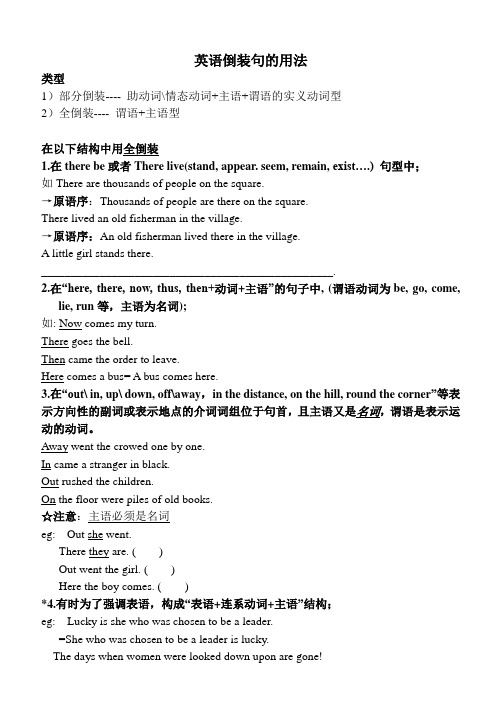
英语倒装句的用法类型1)部分倒装---- 助动词\情态动词+主语+谓语的实义动词型2)全倒装---- 谓语+主语型在以下结构中用全倒装1.在there be或者There live(stand, appear. seem, remain, exist….) 句型中;如There are thousands of people on the square.→原语序:Thousands of people are there on the square.There lived an old fisherman in the village.→原语序:An old fisherman lived there in the village.A little girl stands there.__________________________________________________.2.在“here, there, now, thus, then+动词+主语”的句子中, (谓语动词为be, go, come,lie, run等,主语为名词);如: Now comes my turn.There goes the bell.Then came the order to leave.Here comes a bus= A bus comes here.3.在“out\ in, up\ down, off\away,in the distance, on the hill, round the corner”等表示方向性的副词或表示地点的介词词组位于句首,且主语又是名词,谓语是表示运动的动词。
Away went the crowed one by one.In came a stranger in black.Out rushed the children.On the floor were piles of old books.☆注意:主语必须是名词eg: Out she went.There they are. ( )Out went the girl. ( )Here the boy comes. ( )*4.有时为了强调表语,构成“表语+连系动词+主语”结构;eg: Lucky is she who was chosen to be a leader.=She who was chosen to be a leader is lucky.The days when women were looked down upon are gone!_____________________________________________________________________ *5、在某些表示愿望的感叹句,全倒装。

倒装句的形式和用法倒装句是英语语法中常见的句子结构,主语与谓语动词的次序颠倒。
它在英语中具有一定的运用频率,常见于问句、条件句、方位表达等情景。
本文将深入探讨倒装句的形式和用法,以帮助读者更好地理解和掌握倒装句结构。
一、完全倒装句的形式完全倒装句是最常见的倒装句形式。
在完全倒装句中,谓语动词位于主语之前。
1. 在问句中“Where do you live?”(你住在哪里?)→ “Where live you?”(你住在哪里?)2. 在以介词短语开头的句子中“In the garden stood a beautiful flower.”(花园里有一朵美丽的花。
)→ “A beautiful flower stood in the garden.”(花园里有一朵美丽的花。
)3. 在以表示地点的状语或副词开头的句子中“Here comes the bus.”(汽车来了。
)→ “The bus comes here.”(汽车来了。
)二、部分倒装句的形式部分倒装句是指只将助动词、系动词或情态动词置于主语之前。
1. 在条件句中“If I were you, I would study harder.”(要是我是你,我会更加努力学习。
)→ “Were I you, I would study harder.”(要是我是你,我会更加努力学习。
)2. 在以“only”开头的句子中“Only by working hard can you achieve success.”(只有努力工作,你才能获得成功。
)→ “Only by working hard can you achieve success.”(只有努力工作,你才能获得成功。
)三、倒装句的用法1. 在强调句中“Jane has never been to Paris.”(简从未去过巴黎。
)→ “Never has Jane been to Paris.”(简从未去过巴黎。

英语倒装句的用法归纳英语倒装句中只有注意观察引起倒装的原因,才能更准确地理解句子的含义。
那么你对英语倒装句的使用方法了解多少呢?以下是由店铺整理关于英语倒装句的用法归纳的内容,希望大家喜欢!英语倒装句的用法归纳主语和谓语是句子的核心,它们之间有两种语序一是主语在谓语之前称为自然语序(Natural Order);二是主语在谓语之后则称为倒装语序(Inverted Order)。
而倒装语序中又有完全倒装(Full Inversion)和部分倒装(Partial Inversion)1.完全倒装(Full Inversion):又称"全部倒装",是指将句子中的谓语全部置于主语之前。
此结构通常只用于一般现在时和一般过去时。
①谓语+主语+……There be(的各种形式)+主语(+地点或时间状语)例子:There was a drop in the temperature.温度下降了There are birds singing in the tree.鸟儿在树上唱歌。
②副词小品词+谓语动词+名词主语+……例子:Out rushed a young lady.③过去分词或现在分词+be的各种形式+主语+……例子:Scattered on the floor were several books and magazines.几本书和杂志散落在地板上2.部分倒装(Partial Inversion)(又称半倒装句):指将谓语的一部分如助动词或情态动词倒装至主语之前,而谓语动词无变化。
如果句中的谓语没有助动词或情态动词,则需添加助动词do,does或did,并将其置于主语之前。
英语倒装句的作用英语句子的倒装一是由于语法结构的需要而进行的倒装,二是由于修辞的需要而进行的倒装。
前一种情况,倒装是必须的,否则就会出现语法错误;后一种情况,倒装是选择性的,倒装与否只会产生表达效果上的差异。
1.表示强调倒装句最突出、最常见的修辞效果就是强调,其表现形式如下:1.only +状语或状语从句置于句首,被该状语修饰的句子用部分倒装。
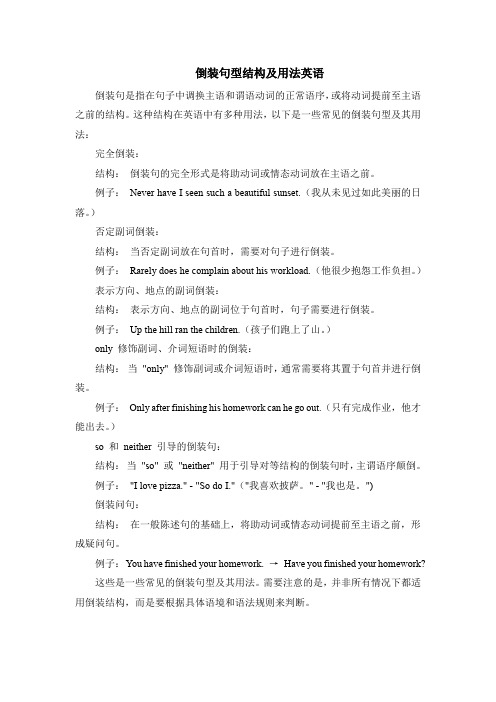
倒装句型结构及用法英语倒装句是指在句子中调换主语和谓语动词的正常语序,或将动词提前至主语之前的结构。
这种结构在英语中有多种用法,以下是一些常见的倒装句型及其用法:完全倒装:结构:倒装句的完全形式是将助动词或情态动词放在主语之前。
例子:Never have I seen such a beautiful sunset.(我从未见过如此美丽的日落。
)否定副词倒装:结构:当否定副词放在句首时,需要对句子进行倒装。
例子:Rarely does he complain about his workload.(他很少抱怨工作负担。
)表示方向、地点的副词倒装:结构:表示方向、地点的副词位于句首时,句子需要进行倒装。
例子:Up the hill ran the children.(孩子们跑上了山。
)only 修饰副词、介词短语时的倒装:结构:当"only" 修饰副词或介词短语时,通常需要将其置于句首并进行倒装。
例子:Only after finishing his homework can he go out.(只有完成作业,他才能出去。
)so 和neither 引导的倒装句:结构:当"so" 或"neither" 用于引导对等结构的倒装句时,主谓语序颠倒。
例子:"I love pizza." - "So do I."("我喜欢披萨。
" - "我也是。
")倒装问句:结构:在一般陈述句的基础上,将助动词或情态动词提前至主语之前,形成疑问句。
例子:You have finished your homework. →Have you finished your homework?这些是一些常见的倒装句型及其用法。
需要注意的是,并非所有情况下都适用倒装结构,而是要根据具体语境和语法规则来判断。

语法中的倒装句用法详解倒装句是英语语法中常见的一种句型,它在句子结构和语序上与一般句子相比有所不同。
倒装句的用法多样,包括完全倒装句、部分倒装句和条件状语从句中的倒装句等。
本文将详细解释倒装句的用法及其相关规则,并引用示例句子加以说明。
一、完全倒装句完全倒装句是指将助动词或情态动词放在句首,主语紧随其后,动词短语(或谓语)置于主语之后。
完全倒装句的常见情况有以下几种:1. 当表示地点或方向的副词置于句首时:例句:Up the hill ran the little boy.(小男孩跑上了山坡。
)例句:Here comes the bus.(车来了。
)例句:Out rushed the crowd when the door opened.(门一开,人群冲了出去。
)2. 当表示时间的副词或短语置于句首时:例句:Yesterday was I absent from school.(昨天我没去上学。
)例句:In a few minutes will the ceremony begin.(几分钟后,典礼将开始。
)例句:At the age of ten did he start learning the piano.(十岁时他开始学钢琴。
)3. 当以“here”或“there”开头时:例句:Here comes the bride.(新娘来啦。
)例句:There goes the alarm.(警报响了。
)例句:There hides a treasure in the cave.(洞里藏着一处宝藏。
)二、部分倒装句部分倒装句是指将助动词、情态动词或谓语动词的某些形式放在句首,主语置于动词之后,另一部分谓语成分仍位于句尾。
部分倒装句的常见情况如下:1. 在问句中:例句:Do you speak English?(你会讲英语吗?)例句:Have you finished your homework?(你完成作业了吗?)例句:Can he swim?(他会游泳吗?)2. 在以“never”、“seldom”、“rarely”、“not until”等否定副词或短语开头的句子中:例句:Never have I seen such a beautiful sunset.(我从未见过如此美丽的日落。

一、部分倒装:在正式文体中,等含有否定意义的副词若位于句首,则其后要用部分倒装:I shall never forgive him. / Never shall I forgive him. 我永远不会宽恕他。
He seldom goes out for dinner. / Seldom does he go out for dinner. 他很少出去吃饭。
He little realizes how important this meetingis. / Little does he realize howimportant this meeting is. 他不甚明白这个会议的重要性。
注意:(1) 对于 not … until 句型,当 not until…位于句首时,其后的主句要用倒装语序:He didn’t leave the room until the rain stopped. / Not until the rain stopped did he leave the room. 雨停了之后他才离开这房间。
(2) 某些起副词作用的介词短语,由于含有否定词,若位于句首,其后要用部分倒装:On no accounts must this switch be touched. 这个开关是绝不能触摸的。
(3) 但是, in no time(立即,马上)位于句首时,其后无需用倒装语序:In no time he worked out the problem. 他马上就算出了那道题。
当一个状语受副词 only 的修饰且置于句首时,其后用部分倒装语序:Only then did he realize that he was wrong. 到那时他才意识到他错了。
Only in this way are you able to do it well. 你只有用这种方法才能把它做好。
”位于句首时的倒装副词 so 后接形容词或副词位于句首时,其后用部分倒装:So cold was the weather that we had to stay at home. 天气太冷,我们只好呆在家里。

英语倒装句的归纳总结在英语语法中,倒装句是一种常见的句子结构。
它通常在问句、条件句和某些表达中使用,以强调或变换语气。
了解和掌握英语倒装句的用法对于提高语言的流利度和准确性非常重要。
本文将对英语倒装句的使用进行归纳总结。
一、表示完全倒装的情况1. 在表示条件的句子中,如果将谓语动词提前,则需要完全倒装。
例如:Had I known your opinion earlier, I would have chosen differently.(要是我早知道你的意见,我会做出不同的选择。
)Should you need any assistance, feel free to ask.(如果你需要任何帮助,随时问我。
)2. 当表示否定意义时,主语和助动词倒装。
例如:Not only did she forget my birthday, but she also didn't apologize.(她不仅忘记了我的生日,而且也没有道歉。
)Never have I seen such a beautiful sunset before.(我以前从未见过如此美丽的日落。
)二、表示部分倒装的情况1. 在使用否定副词或短语(如never, seldom, hardly, little, nowhere等)引导的句子中,形容词或副词位于句首,主语和谓语动词部分倒装。
例如:Hardly had I started my work when the phone rang.(我刚开始工作,电话就响了。
)Never before have I heard such a beautiful song.(我以前从未听过如此美妙的歌。
)2. 在以only开头的句子中,only位于句首时,主语和谓语动词部分倒装。
例如:Only by working hard can you achieve your goals.(只有通过努力工作,你才能实现目标。
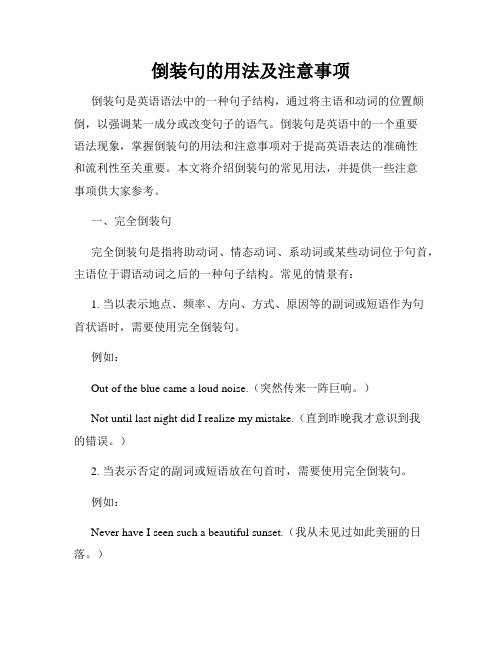
倒装句的用法及注意事项倒装句是英语语法中的一种句子结构,通过将主语和动词的位置颠倒,以强调某一成分或改变句子的语气。
倒装句是英语中的一个重要语法现象,掌握倒装句的用法和注意事项对于提高英语表达的准确性和流利性至关重要。
本文将介绍倒装句的常见用法,并提供一些注意事项供大家参考。
一、完全倒装句完全倒装句是指将助动词、情态动词、系动词或某些动词位于句首,主语位于谓语动词之后的一种句子结构。
常见的情景有:1. 当以表示地点、频率、方向、方式、原因等的副词或短语作为句首状语时,需要使用完全倒装句。
例如:Out of the blue came a loud noise.(突然传来一阵巨响。
)Not until last night did I realize my mistake.(直到昨晚我才意识到我的错误。
)2. 当表示否定的副词或短语放在句首时,需要使用完全倒装句。
例如:Never have I seen such a beautiful sunset.(我从未见过如此美丽的日落。
)Under no circumstances should you give out your personal information.(在任何情况下都不应该泄露个人信息。
)3. 当以倒装词组开头时,需要使用完全倒装句。
例如:Not only does he play the piano, but he also sings.(他不仅会弹钢琴,还会唱歌。
)In no way can we ignore the importance of education.(我们无论如何都不能忽视教育的重要性。
)二、部分倒装句部分倒装句是指将助动词或情态动词置于主语之前,而将主语和谓语动词之间的顺序保持不变的句子结构。
常见的情景有:1. 当以否定词开头时,需要使用部分倒装句。
例如:Never have I been so disappointed.(我从未如此失望过。
倒装句的用法类型1)部分倒装---- 助动词\情态动词+主语+谓语的实义动词型2)全倒装---- 谓语+主语型在以下结构中用全倒装此结构通常只用与一般现在时和一般过去时。
常见的结构有:1.在there be或者There live(stand,appear.seem,remain,exist….) 句型中;如There are thousands of people on the square. Thousands of people are there on the square.There lived an old fisherman in the village. 原语序:An old fisherman lived there in the village.There stands a little girl. 正常语序:A little girl stands there.2.在“here, there, now, thus, then+动词+主语”的句子中,(谓语动词为be, go, come,lie, run等,主语为名词);如: Now comes my turn. There goes the bell. Then came the order to leave.Here comes a bus= A bus comes here.3.在“out\ in, up\ down, off\away,in the distance,on the hill,round the corner”等表示方向性的副词或表示地点的介词词组位于句首,且主语又是名词,谓语是表示运动的动词。
Away went the crowed one by one. In came a stranger in black.Out rushed the children.. Down fell the leaves. On the floor were piles of old books.☆注意:主语必须是名词eg: Out she went.There they are. Here he comes. 而Out went the girl. Here comes the boy.*4.有时为了强调表语,构成“表语+连系动词+主语”结构;eg: Lucky is she who was chosen to be a leader.=She who was chosen to be a leader is lucky.Gone are the days when women were looked down upon!The days when women were looked down upon are gone!*5、在某些表示愿望的感叹句,全倒装。
Long live the People's Republic of China! May you be happy.在以下结构中用部分倒装部分倒装是指将谓语的一部分如助动词或情态倒装至主语之前。
如果句中的谓语没有助动词或情态动词,则需添加助动词do, does或did,并将其置于主语之前。
1.含有否定或半否定意义的词语(如:not,never,seldom,hardly,little,scarcely,barely,few…);或者含有否定意义的连词(not only…but also.., neither..nor.., no sooner had…than...(一。
就。
),scarely..than.., Hardly had when.., not until...;nowher等);或否定意义的介词词组(by no means(决不),in no case\way(任何情况下都不),with no method, at no time(决不), on no account(决不),under no circumstances\condition...(任何情况下都不))位于句首eg: I have never seen him before.=Never have I seen him before.Not a word did he say when he left. Seldom/Scarecely does he go to that park. Hardly(几乎不。
) do I speak to him. Little English can he speak.Little does he realize the importance of the meeting. Few people did I see in the street.含有否定意义的连词:eg:1)Not only can he play basketball, but also I can. 2)No sooner had we arrived home than it began to rain. 3)Hardly had we met our friends when the train left.4)Not until the baby fell asleep did the mother leave the room.(主句倒装,从句不倒装)=The mother didn’t leave the room until the baby fell asleep.注意:1)Not only...but also...必须连接两个分句时,才使用部分倒装。
而且只倒装not only后的分句。
如果连接的是两个并列词语,不用倒装结构。
如:Not only his father but also I like reading. 2)Hardly...when..., Scarcely...than..., No sooner...than...意义基本相同,它们连接的句子,都只倒装前一个分句,及“前倒后不倒(装)”。
3)当not until(直到。
才)引导主从复合句时,主句倒装,从句不用倒装,或者可以理解为“后倒前不倒(装)”。
含有否定意义的介词词组:如:By no means should we tell lies. On no account should we let him leave.At no time决不will I get married to you. In [Under] no circumstances will I lend money to him.注意:in no time(立即,马上)位于句首时,其后无需用倒装语序:In no time he worked out the problem. 他马上就算出了那道题。
2.only+副词;或介词短语;或状语从句时,主句倒装;eg: Only in this way can you use the computer well. (only+介词短语)Only yesterday did he find out that his watch was missing.(only+副词)Only when it began to rain did he finish his job.(only+状语从句)3.so用在句首,表示另一主语“也。
样”时,用“So + be(have,助动词或情态动词)+主语”结构;而表示另一主语“也不。
样”时,用“Nor\Neither + be(have,助动词或情态动词)+主语”结构;注意:若是对上文同一主语的情况进行肯定时,不倒装。
句型为“So+主语+be或do(did)/have ”。
eg:He went to school yesterday, so did I.---David has made great progress recently. --So he has, and so have you.eg:He hasn't finished his homework, and nor have I. eg : If you won't go, neither/nor will I.4.as 作“尽管/虽然”,引导让步状语从句(as可以换成though),由于语法需要,需要部分倒装。
eg:Shortest as/though she is, she is not the richest.(倒装后,最高级前不用冠词)Child as he is, he knows a lot.(倒装后,单数名词前不用a)Fail as I did, I would try again.(倒装后,实义动词提前,在主语后添加助动词。
) Hard as he tried, he didn't pass the exam.(副词提到句首)注意:though位于句首引导让步状语从句时,可以倒装,也可以不倒装。
但as 引导让步状语从句时,必须使用倒装。
否则就变成了原因状语从句。
eg:As he is too young, he couldn't go to school.5.在”so…that…”和”such…that…”引导的结果状语从句中,当so和such位于句首时,用”so\such + adj + 主语+谓语”;eg: So difficult was the exam that most of the students failed to pass it.=The exam was so difficult that most of the students failed to pass it.6.若if 引导的虚拟条件句中有were, had, should 时,可将if省略,把were, had , should 放在句首。
1) Should it rain tomorrow, we would not play basketball.=If it should rain tomorrow, we would not play basketball. 2)Had I prepared well, I couldn't have lost the job.If I had prepared well, I couldn't have lost the job.3) Were he to come tomorrow, I would go to meet him at the airport.=If he were to come tomorrow, I would go to meet him at the airport.倒装句练习题1. Not until I began to work ____ how much time I had wasted.A. didn't I realizeB. did I realizeC. I didn't realizeD. I realized2. Only by practising a few hours every day ____ be able to master the language.A. you canB. can youC. you willD. will you3. If you don't go,neither ____.A. shall I B. do I C. I do D. I shall4. No sooner ____ to the station ____ the train left.A. had I got,whenB. I had got,thanC. had I got,thanD. didI get,when5. —Your father is very strict with you. —_____ He never lets off a single mistake of ours.A. So he isB. So is heC. He is soD. So does he6. ____ today,he would get there by Sunday.A. Would he leaveB. Was he leavingC. Were he to leaveD. If he leave7. Never in my life ____ such a thing.A. I have heard or have seenB. have I heard or seenC. I have heard or seenD. did I hear or see8. ——Here ____!Where is Xiao Liu?There ____.A. comes the bus,is heB. comes the bus,he isC. the bus comes,is heD. the bus comes,he is9. ____ ,I will not buy it. A. Much as do I like itB. As much I like itC. Much as I like itD. As I like it much10. —— I like football. I don't like volleyball. ____.A. So do IB. Neither do IC. So it is with meD. So is it with me11. _____ the expense,I _____ to Italy. A. If it were not,goB. Were it not for\would goC. Weren't it for\will goD. If it hadn't been\would have gone12. So _____ in the darkness that he didn't dare to move an inch.A. he was frightenedB. was he frightenedC. frightened he wasD. frightened was he13. -- In modem times,girls like beautiful clothes.--Yes, _____ and_____ After all, our life has greatly improved.A. so do they,so do youB. so they do,so you doC. so do they,so you doD. so they do,so do you14. —— You have an English class every day except Sunday. _____.A. So we haveB. So we doC. So have weD. So do we15. I wonder if your wife will go to the ball. If your wife _____,so _____ mine.A. does,willB. will,doesC. will,wouldD. does,do16. Only after I read the text over again _____ its main idea.A. that I knewB. did I knewC. 1 could knowD. I did know17--You seem to have learned all the English words by heart. -- _____ .A. So l doB. So do lC. So I haveD. So have I18. -- I seldom watch TV,but listen to the radio a lot. --_____ .A. So do IB. Neither do IC. I m the sameD. So it is with me19. So excited _____ that he couldn't say a word.A. he seemedB. did he seemC. was he seemingD. he did look20. Jimmy was so nervous not a single word _____ down in the dictation.A. he wroteB. he was writtenC. did he writeD. was he written21. Little ______ when 1 took the trip where it would lead me.A. have I knownB. had I knownC. do 1 knowD. did I know22. -- Have you ever seen anything like that before?---- ____.A. No, I never have seen anything like that beforeB. No, never I have seen anything like that beforeC. No, never have 1 seen anything like that beforeD. No, I have seen anything like that before never23. _____ ,1 would accept the invitation and go to the party.A. Were I youB. Was I youC. Had I been youD. Would 1 be you24. You should work less _____.A. and neither should IB. and so should IC. and nor should ID. and so I should25. _____ and caught the mouse.A. Up the cat jumpedB. The cat up jumpedC. Up jumped the catD. Jumped up the cat26. Not only _____ a promise,but also he kept it.A. did he makeB. he madeC. does he makeD. has he made27. His uncle is a worker and has been working in the factory for more than ten years. _____.A. So is his auntB. So has his auntC. So his aunt doesD. So it is with his aunt28. Not once _____ their plan.A. did they changeB. they changedC. changed theyD. they did change29. -- Do you know Jim quarreled with his brother?-- I don't know, and ______ .A. nor don't I careB. nor do I careC. I don't care neitherD. I don't care also30. Not until he arrived home _____ he find that this wallet had been stolen.A. didB. wouldC. whenD. that31. --This is one of the oldest trees in the world. _____ such a big tree.A. Never I have seenB. I haven't never seenC. Never have I seenD. I have seen never32. Nowhere else in the world _____ cheaper tailoring(裁缝业,成衣业)than in Hong Kong.A. a tourist can findB. can a tourist findC. a tourist will findD. a tourist has found33. _____ succeed in doing anything. A. Only by working hard we canB. By only working hard we canC. Only we can by working hardD. Only by working hard can we34. _____ that we all went out,lying in the sun. A. So fine was the weatherB. So was the fine weatherC. The weather was so fine wasD. So the weather was tine35. ____ a nice man ____ that we all believe him.A. So,did he seemB. So,he seemedC. Such,he seemedD. Such,did he seem36. --You seem to be an actor. --___ . I have played many parts in a lot of films.A. So do IB. So am IC. So I doD. So I am37. Not only ____ working hard,but also ____ very polite.A. the boy is,he isB. is the boy,he isC. the boy is,is heD. is the boy,is he38. ____,he never seems able to do the work beautifully.A. Try as he doesB. As he triesC. Try as does heD. As try he does39.-- I cannot see the picture well from here.---- _____.A. Neither can t IB. Neither I canC. I can't neitherD. Neither can I40.--You ought to have given them some advice ---- _____, but who cared what Iasked?A. So ought youB. So 1 oughtC. So it wasD. So I did41. So carelessly _____ that he almost killed himself.A. he drivesB. does he driveC. did he driveD. he drove42. Little _____ about his own health though he was very ill.A. he caredB. did he careC. he caresD. does he care43. Well ____ know him and well ____ know me.A. I did,he didB. did I,he didC. did I,did heD. I did,did he44. No sooner ____ they rushed out into the street.A. did they hear the news thanB. did they hear the news whenC. had they heard the news thanD. had they heard the news when45. Little wonder _____ up their hands in dismay. A. have some thrownB. some have thrownC. thrown some haveD. have thrown some46. ____,he would have passed the exam. A. If he were to studyB. If he studied hardC. Had he studied hardD. Should he study hard47. We were lucky enough,for no sooner _____ home _____ it rained.A. we returned,andB. we had returned,whenC. did we return,whenD. had we returned,than48. So little _____ agree on the plan that they could not settle their difference.A. did theyB. do theyC. they didD. they did not49. _____ he realized it was too late to return home.A. No sooner it grew dark thanB. Hardly did it grow dark whenC. It was not until dark thatD. It was until dark that参考答案1~5 BDACA 6~10 CBBCC 11~15 BDDBA 16~20 BADBC 21~25 DCABC26~30 ADABA 31~35 CBDAD 36~40 DBADD 41~45 CBCCB 46~49 CDAC。